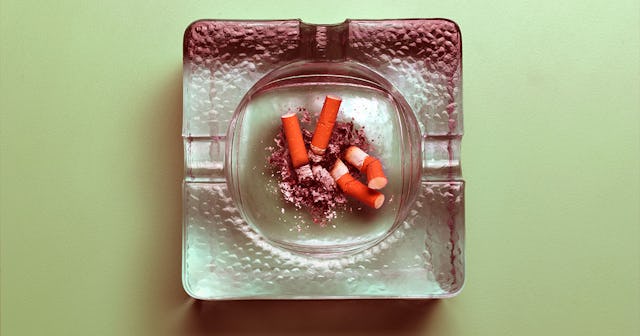Smokers Could Be Getting Vaccinated Before Teachers, And People Are Pissed

Unless you are an irresponsible and illogical anti-vaxxer or someone who doesn’t believe COVID-19 exists and are convinced the vaccine is loaded with a government surveillance tracking device, you are eagerly waiting for your first round of immunity. The CDC has provided recommendations to local, state, and federal governments on how to distribute the COVID-19 vaccine. Healthcare workers and folks living in long-term care homes were first in line; the next groups of people included frontline workers and folks 75 years and older. In some states, the vaccine is now being offered to people ages 16-64 who are at high risk for serious COVID-19 related illness because of underlying medical conditions. One of those conditions includes smoking.
During non-pandemic times, smoking is the leading cause of preventable deaths. Smoking causes cancer, heart disease, diabetes, lung diseases, and a mix of other conditions that negatively impact every organ of the body. Dr. Joe Zein, a pulmonologist at the Cleveland Clinic, says, “Smoking induces structural changes in the respiratory tract and compromises people’s ability to mount appropriate immune and inflammatory responses (against infections).” This sets the stage for poor outcomes for folks who contract COVID-19.
A study done by the University of California, Los Angeles, showed how smoking makes a COVID-19 infection much worse in a person’s airways. While one could say this is simply common sense, researchers discovered that cigarette smoke blocked the activity of interferons, which are immune system messenger proteins. If these proteins can’t attack the virus, then the rest of the immune system doesn’t know to jump in and help the body fight an infection.
Because smokers are more likely to get sick and are more susceptible to COVID-19, the CDC has prioritized their vaccine date over the general population. Look no further than your town’s Facebook group or community online forum and you will see that some people aren’t happy about this. Many folks believe smoking is a choice and that those who created their own medical problems shouldn’t be “rewarded” with a vaccine before a non-smoker. But medical professionals are not viewing this decision as a political one, or one based on opinion. “It’s a population that we know is at risk, whether it was a good choice, or a bad choice to become a smoker. They are smokers, they’re at risk of getting sick, and needing medical services, so if we can keep them healthy that helps society in general,” says Dr. Albert Rizzo, the chief medical officer of the American Lung Association.
Peter Dazeley/Getty
The goal of vaccinations is to reduce disease, loss of life, and strains on our health care system. Vaccines protect individual people, but they also protect the societal systems we all rely on. Not vaccinating smokers puts the whole community at risk. Part of “flattening the curve” was to keep people out of hospital beds, off ventilators, and reduce time staff had to spend on patient care related to COVID-19 so that other non-COVID-19 illnesses and emergencies could still be treated. Many folks have had to put off non life-threatening surgeries and routine health checks because they either can’t get an appointment or don’t think it’s safe to venture to places where they could be exposed to the virus.
One can and should argue, too, that smoking doesn’t just cause diseases, but the addiction to nicotine that perpetuates smoking is itself a disease. Nicotine is highly addictive, and the majority of smokers wish they never started and wish they could quit. Only about 6% of smokers are able to stop within a year’s time. And for those who do try to quit, it often takes several attempts before that final cigarette is smoked or pen is vaped. Not only does the rush of nicotine make the user feel good, but the lack of it and the withdrawal symptoms make a person feel even worse.
We can set boundaries for where and when folks can smoke, just like we do with other drugs and alcohol, but we need to treat smokers as addicts and eliminate the shame and blame. As an addict myself who is in recovery, I promise that sobriety and giving up substances is possible. But I can also tell you it’s not easy and can’t be done without support.
Another piece of the debate regarding smokers getting their vaccines before the general public is that they were prioritized over teachers, who have been considered essential workers. Not every teacher is teaching from the classroom, but all teachers are invaluable, and many people think they should have been vaccinated at the same time as other frontline workers. Any teacher who hasn’t met the age or health requirements and who is showing up for in-person learning should have been vaccinated sooner, in my humble opinion. Not all health care providers are seeing patients right now, yet many who are able to conduct their practice over Zoom were vaccinated before teachers who are putting themselves at risk every day by working to keep our kids in school. About 28 states have made some or all teachers eligible to receive the vaccine, but availability is the driving factor.
When supply is limited, folks are given priority to the vaccine based on their risk assessment and medical history. Whatever your take is on smoking, a smoker is at higher risk of COVID-19 related illness and death than a non-smoker, period. Therefore, they will get their shot first when all other qualifications are similar or equal. The good news is that this will benefit the entire community — and that’s what it will take to get us out of this pandemic.
This article was originally published on